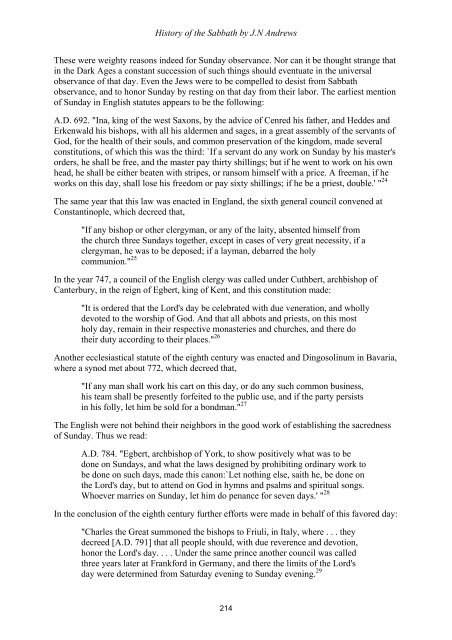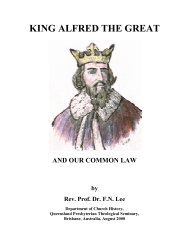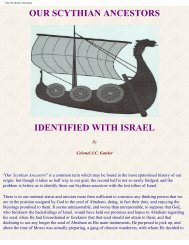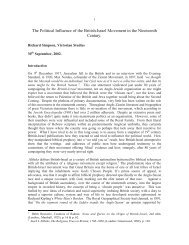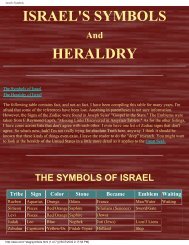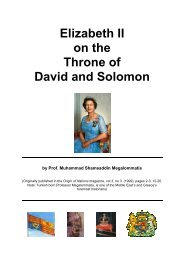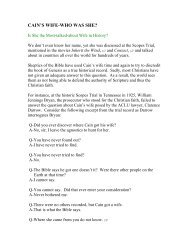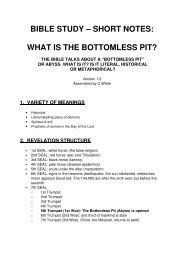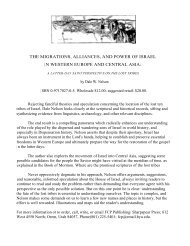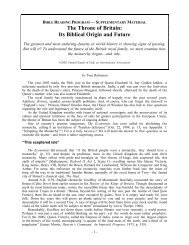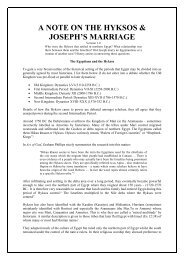HISTORY OF THE SABBATH - Friends of the Sabbath Australia
HISTORY OF THE SABBATH - Friends of the Sabbath Australia
HISTORY OF THE SABBATH - Friends of the Sabbath Australia
Create successful ePaper yourself
Turn your PDF publications into a flip-book with our unique Google optimized e-Paper software.
History <strong>of</strong> <strong>the</strong> <strong>Sabbath</strong> by J.N AndrewsThese were weighty reasons indeed for Sunday observance. Nor can it be thought strange thatin <strong>the</strong> Dark Ages a constant succession <strong>of</strong> such things should eventuate in <strong>the</strong> universalobservance <strong>of</strong> that day. Even <strong>the</strong> Jews were to be compelled to desist from <strong>Sabbath</strong>observance, and to honor Sunday by resting on that day from <strong>the</strong>ir labor. The earliest mention<strong>of</strong> Sunday in English statutes appears to be <strong>the</strong> following:A.D. 692. "Ina, king <strong>of</strong> <strong>the</strong> west Saxons, by <strong>the</strong> advice <strong>of</strong> Cenred his fa<strong>the</strong>r, and Heddes andErkenwald his bishops, with all his aldermen and sages, in a great assembly <strong>of</strong> <strong>the</strong> servants <strong>of</strong>God, for <strong>the</strong> health <strong>of</strong> <strong>the</strong>ir souls, and common preservation <strong>of</strong> <strong>the</strong> kingdom, made severalconstitutions, <strong>of</strong> which this was <strong>the</strong> third: `If a servant do any work on Sunday by his master'sorders, he shall be free, and <strong>the</strong> master pay thirty shillings; but if he went to work on his ownhead, he shall be ei<strong>the</strong>r beaten with stripes, or ransom himself with a price. A freeman, if heworks on this day, shall lose his freedom or pay sixty shillings; if he be a priest, double.' " 24The same year that this law was enacted in England, <strong>the</strong> sixth general council convened atConstantinople, which decreed that,"If any bishop or o<strong>the</strong>r clergyman, or any <strong>of</strong> <strong>the</strong> laity, absented himself from<strong>the</strong> church three Sundays toge<strong>the</strong>r, except in cases <strong>of</strong> very great necessity, if aclergyman, he was to be deposed; if a layman, debarred <strong>the</strong> holycommunion." 25In <strong>the</strong> year 747, a council <strong>of</strong> <strong>the</strong> English clergy was called under Cuthbert, archbishop <strong>of</strong>Canterbury, in <strong>the</strong> reign <strong>of</strong> Egbert, king <strong>of</strong> Kent, and this constitution made:"It is ordered that <strong>the</strong> Lord's day be celebrated with due veneration, and whollydevoted to <strong>the</strong> worship <strong>of</strong> God. And that all abbots and priests, on this mostholy day, remain in <strong>the</strong>ir respective monasteries and churches, and <strong>the</strong>re do<strong>the</strong>ir duty according to <strong>the</strong>ir places." 26Ano<strong>the</strong>r ecclesiastical statute <strong>of</strong> <strong>the</strong> eighth century was enacted and Dingosolinum in Bavaria,where a synod met about 772, which decreed that,"If any man shall work his cart on this day, or do any such common business,his team shall be presently forfeited to <strong>the</strong> public use, and if <strong>the</strong> party persistsin his folly, let him be sold for a bondman." 27The English were not behind <strong>the</strong>ir neighbors in <strong>the</strong> good work <strong>of</strong> establishing <strong>the</strong> sacredness<strong>of</strong> Sunday. Thus we read:A.D. 784. "Egbert, archbishop <strong>of</strong> York, to show positively what was to bedone on Sundays, and what <strong>the</strong> laws designed by prohibiting ordinary work tobe done on such days, made this canon:`Let nothing else, saith he, be done on<strong>the</strong> Lord's day, but to attend on God in hymns and psalms and spiritual songs.Whoever marries on Sunday, let him do penance for seven days.' " 28In <strong>the</strong> conclusion <strong>of</strong> <strong>the</strong> eighth century fur<strong>the</strong>r efforts were made in behalf <strong>of</strong> this favored day:"Charles <strong>the</strong> Great summoned <strong>the</strong> bishops to Friuli, in Italy, where . . . <strong>the</strong>ydecreed [A.D. 791] that all people should, with due reverence and devotion,honor <strong>the</strong> Lord's day. . . . Under <strong>the</strong> same prince ano<strong>the</strong>r council was calledthree years later at Frankford in Germany, and <strong>the</strong>re <strong>the</strong> limits <strong>of</strong> <strong>the</strong> Lord'sday were determined from Saturday evening to Sunday evening. 29214


